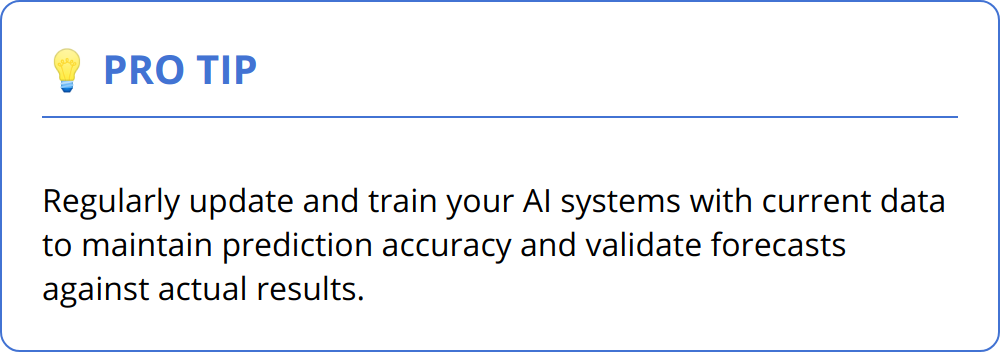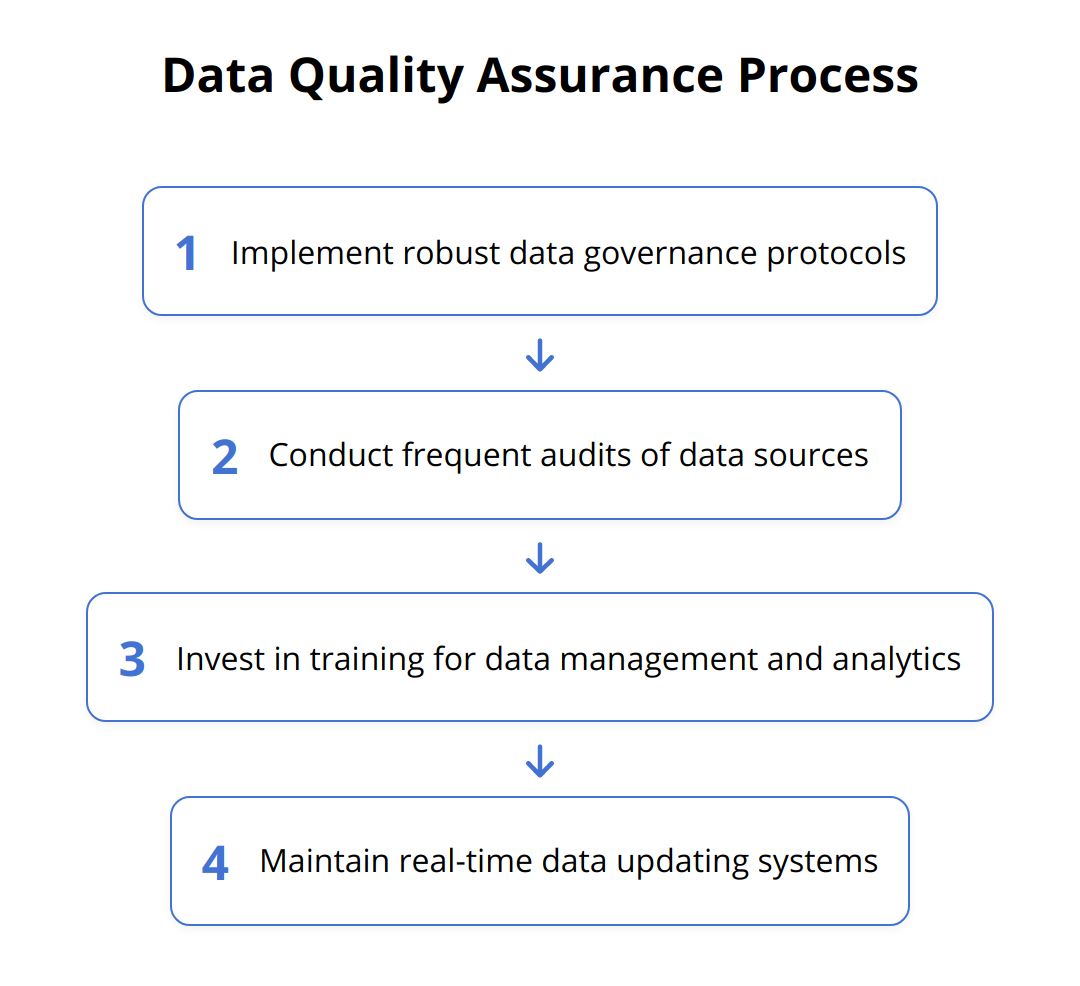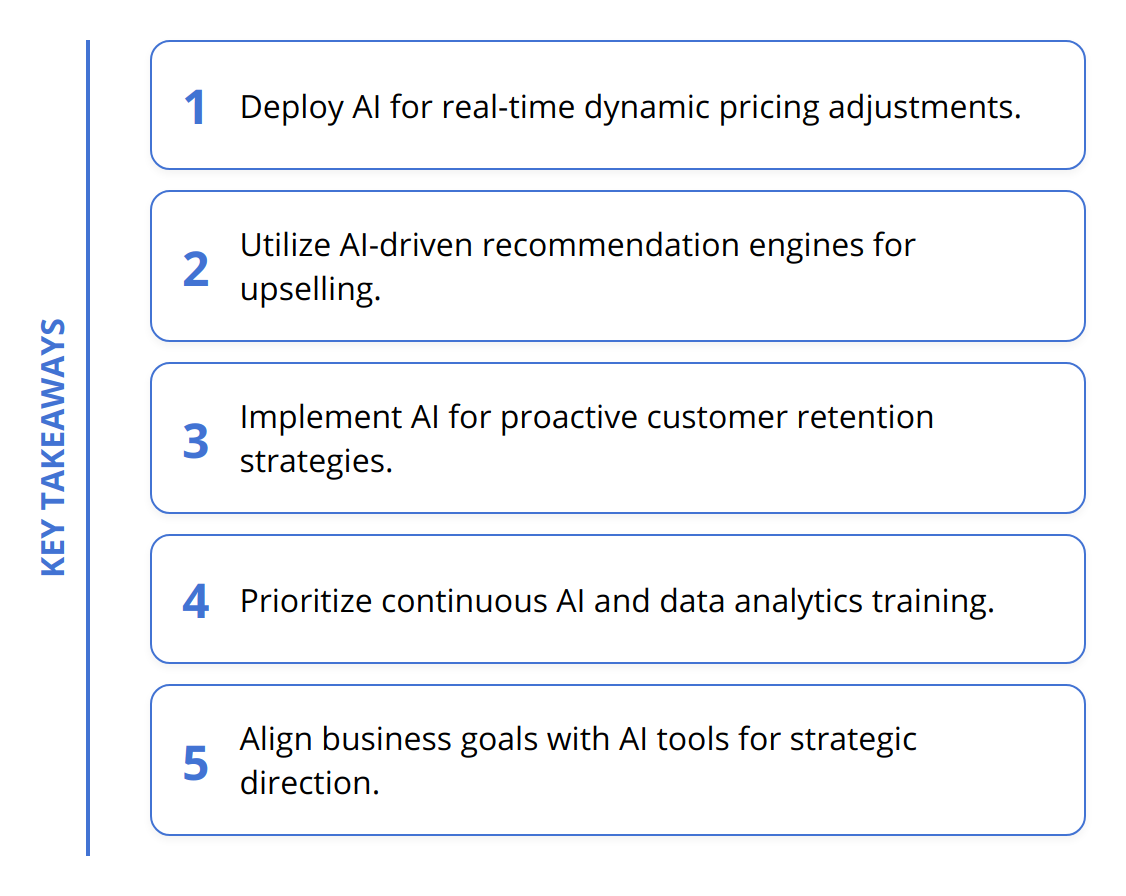The landscape of sales is shifting rapidly, evolving into a realm where data is king and predictive analytics reign supreme. We at Emplibot recognize that AI is at the forefront of transforming sales forecasts, providing unprecedented accuracy and insights.
Artificial intelligence isn’t just changing the game; it’s redefining how sales teams approach the future. This blog post explores the dynamic fusion of AI with sales processes, and the undeniable benefits of embracing this technology to boost performance and personalize customer experiences.
Inhalt
ToggleHow Does AI Sharpen Sales Predictions?
Integrating AI into sales strategies is no longer an option; it’s a decisive move for businesses intent on staying ahead. With machine learning at its core, AI drastically reduces the margin of error in sales predictions. It’s clear that relying on human analysis alone won’t cut it anymore. Let’s get into the transformation of sales forecasting with AI and machine learning.

Sharpening the Accuracy of Predictions with AI
When it comes to sales predictions, nothing is more valuable than precision. Accurate forecasts lead to better planning, resource allocation, and ultimately, an upward swing in revenue. AI mines through years of sales data and customer interactions to detect patterns invisible to the naked eye. Here’s the practical payoff:

- Deeper insights through data: AI tools sift through volumes of sales data, identifying trends and anomalies that point towards future sales outcomes.
- Real-time adjustments: Forecasting isn’t a one-off event. AI continually adjusts predictions based on new data, keeping forecasts fresh and relevant.
- Beyond the obvious: AI digs deeper than surface trends, correlating diverse data points that factor into sales success—like seasonal variations and market shifts.
For example, a retail company might notice an unexpected spike in online purchases every third Friday of the month. AI could pinpoint this trend and trace it back to a pattern of payday spending among consumers, allowing for targeted promotions to maximize sales.
Machine Learning’s Role in Dissecting Market Trends
The heart of any effective AI system is machine learning. This is where data isn’t just collected; it’s understood and translated into actionable suggestions.
- Analyzing past to predict the future: Machine learning algorithms train on historical data and can project future trends with remarkable accuracy.
- Catching the wave of real-time shifts: By evaluating current market conditions, these algorithms can predict short-term changes and allow businesses to react swiftly.
- Highlighting customer behavior: Understanding what drives your customers is key. Machine learning analyzes purchasing patterns, helping tailor marketing and sales efforts.
In practice, this can mean noticing that a new competitor’s marketing campaign has begun to influence your market share. AI can alert you to this development in real time, enabling a proactive response to position your product more aggressively.
To wrap it up, AI augments the capabilities of sales teams to not only react to the market but anticipate its movements. By leveraging sophisticated algorithms, businesses can benefit from robust, data-driven strategies that were previously impossible. The takeaway here is that incorporating AI into sales processes is not simply a modern convenience; it’s a strategic necessity to forge ahead in a data-dominant era.

As we continue exploring how AI propels sales into the future, remember that embracing AI is more than a technological shift—it’s about adopting a new mindset with data at its helm, preparing for a future where numbers narrate the story of success.
- Invest in AI tools with a proven track record.
- Regularly train your AI systems with up-to-date data.
- Always validate AI-driven forecasts against actual results.
For those keen to explore further about AI and its impact on marketing and sales, consider reading about the future trends in marketing automation and how AI intersects with data analytics in marketing.
Possibilities with AI-Driven Sales Strategies
The advancement in AI technology brings us to the brink of an era where sales forecasting is not just about predictions, but about precise adaptability and the delivery of personalized customer experiences. Moving forward, the most successful sales teams will be those who harness AI to turn real-time data into actionable sales strategies and enhanced customer engagement.
Embracing AI allows sales teams to make decisions based on up-to-the-minute insights, adjusting strategies to remain competitive despite the fast-paced nature of market changes. This evolution from static predictions to dynamic forecasting signifies a leap in the capability to respond to market conditions as they happen, rather than relying on dated reports.
Here’s how practical application of AI in sales strategy can unfold:
- AI provides the sales force with instantaneous market analytics, spotlighting sudden shifts in consumer demand or competitive tactics.
- Teams can deploy personalized customer interaction strategies, thanks to AI’s knack for analyzing individual customer data and predicting behavior patterns.
- Sales strategies can shift from generalized to highly targeted, focusing on micro-segments within a market to capitalize on niche opportunities.
Taking these insights, here are some direct steps to apply AI for cutting-edge sales forecasting:
- Develop dynamic pricing models that adjust in real-time based on market demand signals captured by AI.
- Utilize AI-driven recommendation engines to cross-sell and upsell, depending on individual customer purchase patterns.
- Implement adaptive resource distribution systems to allocate sales effort towards high-opportunity areas identified by AI insights.
One real-world application already making waves is the use of AI to anticipate customer issues before they escalate, contributing directly to customer retention and satisfaction. For instance, businesses are using AI to detect early signs of customer discontent through sentiment analysis, enabling proactive solutions that can turn potential negatives into positives.
In the realm of personalization, AI goes beyond basic demographics and past purchase history. Sophisticated AI algorithms can weave together data from social media activity, customer service interactions, and even local economic indicators to create highly-tailored customer experience strategies.
To stay ahead, it’s vital to:
- Monitor the latest AI marketing tools to stay on the cutting edge of AI applications in sales.
- Continuously audit and update your data sources to feed AI models with only the highest-quality input.
- Keep your sales team skilled and agile, ready to interpret and act on AI-provided insights.
The integration of AI into the sales realm promises a transformation not just in the numbers but in the way businesses connect with their customers. This is a tide that’s rising rapidly, and it’s time to set sail—if not, risk being outmaneuvered by more AI-savvy competitors.
Integrating AI into Sales Pipelines
Embedding AI into sales pipelines represents the next leap in strategic business growth. Navigating this new terrain involves more than just access to cutting-edge tools; it demands a shift in the very DNA of a sales organization. Here’s a spotlight on the practical steps and inherent challenges encountered when AI meets traditional sales processes.
Reimagining the Sales Pipeline with AI
Sales pipelines have traditionally been managed through intuition and experience, but integrating AI reshapes them into data-driven powerhouses. The change, though, isn’t without its growing pains. Sales teams might face initial resistance due to the perceived complexity of AI technologies. The real trick lies in demystifying AI and showing its tangible benefits to sales outcomes.
Embracing AI in sales pipelines leads to enhanced lead qualification, robust customer engagement, and ultimately, revenue growth. For example, by automating lead scoring with AI, teams can prioritize high-value prospects and customize engagement tactics, leading to more successful conversions.
Equipping Sales Teams with AI Mastery
To fully harness AI, sales teams must become proficient in leveraging the technology. This boils down to extensive skill development and training programs centered around AI tools being implemented. Sales professionals must understand how to interpret AI-driven insights to craft winning strategies.
Here are prime action points to train sales teams for AI integration:
- Conduct regular workshops focusing on new AI tools and their functionalities.
- Incorporate AI training into the onboarding process of new sales hires.
- Encourage a culture of continuous learning to keep pace with AI advancements.
Take the lead scoring system—a quintessential AI application. Equipping sales reps with the knowledge to understand and trust the scoring criteria used by AI can bridge the gap between mere data points and successful sales interactions.
Overcoming AI Integration Challenges
Merging AI with existing sales pipelines means overcoming several hurdles:
- Sales data often lives in silos; integrating it into a cohesive AI framework can be daunting.
- A shift from traditional methods to AI requires a cultural metamorphosis within the sales team.
- There’s a persistent misconception that AI might replace human sales roles, rather than augmenting them.
Having a robust change management strategy in place can ensure a smoother transition. Moreover, showcasing case studies of AI’s success in similar businesses can boost confidence and buy-in from hesitant team members. For insights, explore how AI is used in market research techniques.
To summarize, integrating AI into your sales process isn’t just about adopting new technology; it’s about transforming your salesforce into data-savvy professionals. With commitment and continuous education, the transition can lead your team to not just meet but exceed their sales targets.
As AI continues to advance, so must our sales teams, staying equipped and ready to convert real-time data into solid sales strategies.

Embracing a Data-Driven Future
The shift towards data-driven decision-making in sales is not just imminent; it’s already here. The future belongs to those who recognize that high-quality data is the fuel powering AI’s predictive engines. For sales teams, this means adopting a razor-sharp focus on gathering and utilizing top-notch data to feed their AI tools. With the right data, AI can unveil insights that lead to more strategic actions and a substantial competitive advantage.
The Bedrock of AI Forecasting: Stellar Data Quality
Subpar data quality is the Achilles’ heel of AI forecasting. Mistakes made in data collection and preparation ripple through the entirety of the AI’s predictive capability, leading to misguided strategies that can be costly. Quality data, on the other hand, ensures that AI functions at its peak efficiency, turning good sales teams into exceptional ones. Here are essential elements to guarantee data quality for AI predictions:
- Implement robust data governance protocols.
- Conduct frequent audits of data sources.
- Invest in training for data management and analytics.
- Maintain real-time data updating systems.
These actions aren’t merely suggestions; they are imperatives for those aiming to lead in tomorrow’s market.

Laying the Groundwork for AI-Augmented Sales Decisions
As the sales environment becomes more sophisticated, the ability to make quick, data-backed decisions is paramount. Sales professionals must be well-versed in data analysis and interpretation—skills that are crucial to understanding AI-derived insights. Here’s what to focus on to prepare your team for a data-driven strategic sales framework:
- Equip your team with advanced data analytics tools.
- Focus on continuous learning and adaptation to new data insights.
- Foster a culture where data-driven decisions are the norm.
Optimizing AI with Data-Driven Insights
A sales strategy informed by AI can only be as good as the data it analyzes. Combining AI’s predictive capabilities with a strong data foundation leads to not only forecasts but foresight—a profound understanding of market drivers that enables proactive strategy refinements. To optimize AI’s potential:
- Align AI tools with business goals for a unified strategic direction.
- Encourage cross-departmental collaboration to ensure data reflects a holistic view of the business.
- Dive deep into customer data to personalize offerings and maximize sales opportunities.
Businesses must also be vigilant in monitoring for new sources of data, as emerging trends can offer fresh insights for the AI to analyze. Keeping an eye on new trends in content marketing helps companies stay agile and responsive to market needs.
The Future of Sales: AI-Infused and Strategy-Intensive
The ability of a business to not just survive but thrive in a data-centric future hinges on its ability to integrate AI into its sales strategies effectively. Here are point-blank strategies for future-proofing your sales approach:
- Prioritize investing in AI that offers interpretive analytics for decision-making.
- Systematically cleanse and process data for optimal AI utilization.
- Tailor your AI adoption strategy to reflect the unique nuances of your market and customer base.
The trajectory for sales success is clear: it’s steeped in data, driven by AI-enabled analytics, and reliant on the caliber of human intelligence to interpret and act on the insights provided. Companies that skilfully blend these ingredients will find themselves outpacing competitors stuck in outdated sales paradigms.
The road ahead is brimming with opportunities for those who regard high-quality data as the linchpin of sales success. The next chapter will build off this foundation, exploring specific strategies and tools that businesses can adopt to fully realize the potential of data-driven sales forecasting.
Wrapping Up
Artificial Intelligence (AI) is dynamically carving out the future of sales, steering us away from guesswork and towards confident decision-making grounded in data. In embracing AI for sales success, businesses are uncovering not just the trends of tomorrow, but also crafting more personalized, customer-focused strategies today.

Sales teams armed with AI are setting new benchmarks for efficacy, efficiency, and engagement. This integration extends beyond mere tools to an overarching metamorphosis in sales culture. In this transition, data quality becomes paramount, and the sales forecasts generated by AI become not just guesses but near certainties. Here’s a snapshot of how AI-driven decisions are elevating the sales practices:
- Data-driven Predictions: Teams wield real-time market insights to swiftly navigate changing landscapes with precision.
- Customer Centricity: Deep learning reveals granular customer insights, enabling hyper-personalized engagement.
- Strategic Agility: AI’s adaptability means strategies evolve with the market, ensuring continued relevance and impact.
At Emplibot, we’ve seen firsthand the transformative potential of AI, and its impact is clear: adopting AI in sales processes is more than a trend—it’s the new foundation for competitive advantage. And when it comes to content, the same principles of AI efficacy apply. We at Emplibot harness AI to provide businesses with the powerful ability to publish SEO-optimized content to their WordPress sites effortlessly. Like the AI tools redefining sales, Emplibot delivers a seamless, automated blogging solution that captures audience attention and builds digital presence.
To effectively harness the potential of AI in sales operations, consider these straightforward recommendations:
- Adopt AI tools that strengthen forecasting and decision-making processes.
- Consistently nurture a culture that values data intelligence and customer insights.
- Look beyond short-term gains, focusing on sustainable growth through AI integration.
We believe that businesses willing to integrate AI into their sales strategy will be the trailblazers of tomorrow. To stay at the vanguard of this shift, whether in sales forecasting or building an online domain with tailored content, turn to the best AI tools for B2B marketing and explore how tools like Emplibot can streamline your content creation at Emplibot’s website.
In conclusion, the AI-augmented sales environment is a reality unfolding before us. As it becomes more entrenched, those willing to invest in AI and data quality will likely lead the pack. The future of sales lies in predictive analytics and personalized strategies, and with AI, that future is now.











